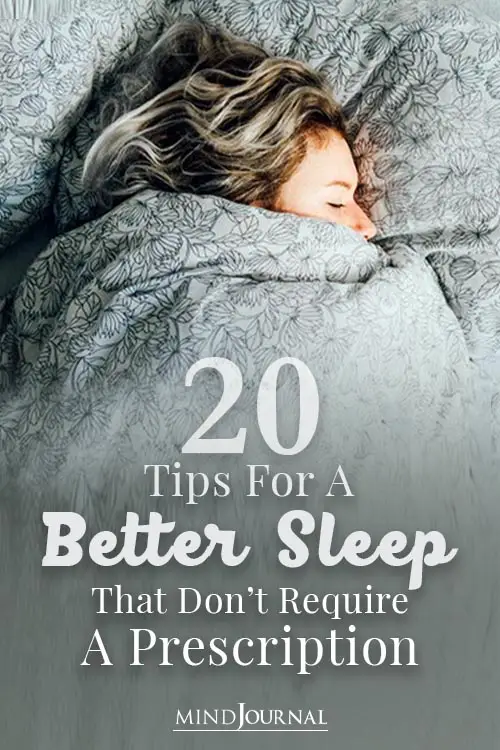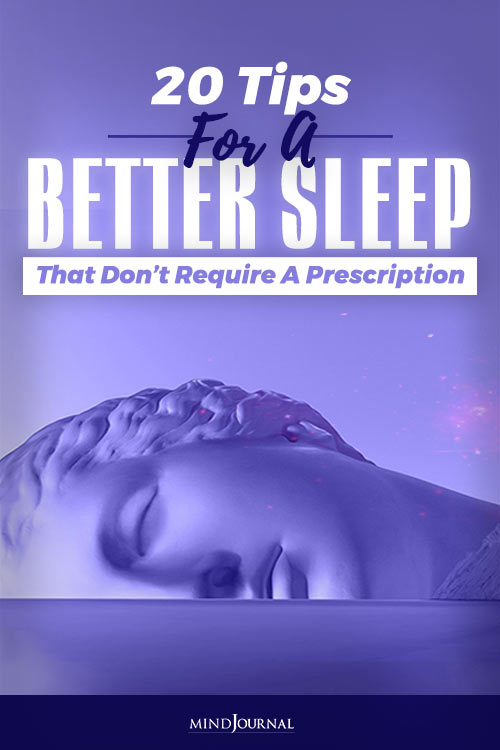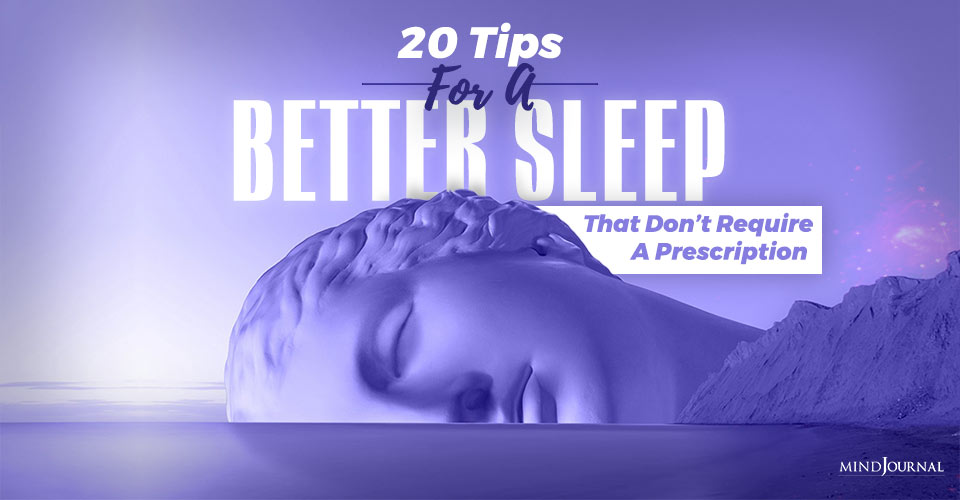In our daily frenzied life, sleep is often prioritized at the last. While stealing some sleep time to accomplish your tasks is okay, major sleep deprivation can lead a person to undergo major health and mental issues. People juggling with a hectic schedule often suffer from chronic sleep deficits. But, there are people maintaining fixed sleep and wake-up times ensuring 7 to 9 hours of sleep. Is it hard for you? Then you are not alone.
Tips for better sleep so that you don’t mess up with your circadian rhythm.
We tend to think about routines when a new school season begins. Yet, I find that one of the key tricks to keeping my life on track is going to bed at the same time no matter what. That can feel challenging when summer is here and the sun doesn’t set until late.
That can also feel challenging when the new fall shows begin, holiday parties are abundant, or spring arrives. The thing is, though, if you want to live a life you love, ensuring you get better sleep is critical.
Related: How Sleep affects Your Mental Health
I’m a big fan of getting adequate sleep. I also know how easy it is to slip into the habit of going to bed later. I mean, hey, the summertime with all those hours of evening sunlight! An invitation for an evening walk or have a get-together with friends. Once you get out of the routine of making sleep a priority, it’s hard to get back in the groove.
Related: How Screen Time Affects Quality Of Sleep And Overall Health of Young Adults
There are so many attractive options: television, Facebook, and Netflix. And when the weather is nice, a late walk or sitting on the porch is relaxing.
Yet, there are also many important reasons to ensure that you are getting enough sleep.
1. Sleep Improves Memory
Your mind is surprisingly busy while you snooze. During sleep, you can strengthen memories or “practice” skills learned while you were awake (it’s a process called consolidation). This consolidation also helps you learn new skills – whether it’s French or a new golf swing.
2. Sleep Spurs Your Creativity
Get a good night’s sleep before creating art: from knitting to painting to writing. In addition to consolidating memories, or making them stronger, your brain appears to reorganize and restructure them, which may result in more creativity as well.
Researchers at Harvard University and Boston College found that people seem to strengthen the emotional components of a memory during sleep, which may help spur the creative process. That also means that it helps you be more creative when it comes to problem-solving!
Related: Insomnia 101: Causes, Symptoms Of Insomnia & How To Sleep Better
3. Adequate Sleep Encourages a Healthier Waistline
Did you know that sleep and metabolism are controlled by the same sectors of the brain? Researchers at the University of Chicago studied dieters that lost similar amounts of weight. Those that were well-rested lost mostly fat while those who were sleep-deprived lost mostly muscle mass. Dieters in the study also felt hungrier when they got less sleep.
4. Curb Inflammation with Better Sleep.
One of the most eye-opening lectures I’ve attended was about the body, health, and inflammation. The doctor explained that inflammation is our body’s attempt to get our attention.
What he called loud inflammation like aching joints was a precursor to those silent big-deal inflammations: heart disease, stroke, diabetes, arthritis, and premature aging. Research indicates that people who get less sleep – six or fewer hours a night – have higher blood levels of inflammatory proteins than those who get more.
5. More Sleep Helps Lower Stress
When it comes to our health, stress, and sleep are nearly one and the same and both can affect cardiovascular health.
You may be nodding your head. Or you may be saying, yes, I KNOW all this, but sleep and I are just not friends. How do all this knowledge and the pressure to get more sleep and better sleep actually equal ME being able to do so? I hear you, sister!
I know I’m not the only one in my age group who regularly wakes at 3 AM, unable to drift back off. And, honestly, several days in a row of waking up in what should be the middle of the night makes me feel crappy and even more stressed.
If you’re struggling with sleep issues, it’s important to address them for your mental, physical, and emotional health. Yes, a visit to your doctor may be in order. First, though, give some of these holistic tips for better sleep a try.
Watch this video to know why sleep is your superpower:
Here are twenty tips for better sleep that don’t require a prescription:
1. Create a Relaxing Evening Routine.
This is one of the best tips for better sleep. Ease the transition from wake time to sleep time with a period of relaxing activities an hour or so before bed. Read a book or practice meditation. Watch a soothing TV show (just not from bed).
Take a bath (the rise, then fall in body temperature promotes drowsiness). Prepare for the day ahead so you don’t worry about getting out the door. Also, avoid stressful, stimulating activities—doing work, watching the news, discussing emotional issues to get better sleep. Physically and psychologically stressful activities can cause the body to secrete the stress hormone cortisol, which is associated with increasing alertness.
2. Keep Your Internal Clock Set with a Consistent Sleep Schedule.
This is one of the best tips for better sleep. Going to bed and waking up at the same time each day sets the body’s “internal clock” to expect sleep at a certain time night after night. I know it’s tempting to stay up late or sleep in on the weekends. (Especially when you’re struggling with adequate sleep.)
However, try sticking to your routine on the weekends, too. Waking up at the same time each day is the very best way to set your body clock. Even if you didn’t sleep well the night before.
Related: 3 Best Supplements for Better Sleep
3. Do the Math.
If you aren’t getting adequate sleep, do the math to figure out what time you need to go to bed to ensure you do. That means that going to bed past midnight doesn’t work if your alarm goes off at 6 AM. If you struggle with going to bed, set an alarm on your phone to begin getting ready for bed at the optimum time.
4. Listen to Your Body and Let It Overrule the Clock.
There are just going to be those days when you’re exhausted at 8 PM. Stop trying to force yourself to stay up until a “reasonable” bedtime and go to bed already. It’s your body’s way of asking for more sleep without running late for work.
5. Lower the Temperatures.
Often, waking during the night is due to being too warm. Keeping the temperature comfortably cool. An ambient temperature that’s between 60 and 67 degrees is typically ideal for sleep. (We sleep at 64 in the summer and 62 in the winter.)
6. Sleep Naked.
When you sleep naked, there are no pajamas or nightgowns to get tangled in. Nightwear can invariably make you hotter or feel anxious during active dreams. When you sleep naked, it helps keep your body temperature at the optimal ranges so your body can better create cortisol. If you sleep overheated your cortisol levels tend to stay high, even after you wake up.
This can lead to increased anxiety, cravings for bad food, weight gain, and more terrible things. Sleep naked so you can keep your body temperature down. And sleep well so your body can properly produce and regulate cortisol.
7. While You’re Sleeping Naked, Do So with Your Partner.
Our bodies need to be cool for better sleep, but as humans, we also need intimacy. Sleeping naked with a partner gives you the opportunity for skin-on-skin contact. That kind of intimate contact releases copious amounts of oxytocin, which is the neurotransmitter that helps you feel good – about yourself and your honey.
8. But Don’t Sleep with Fido Or Fluffy.
I confess I’ve slept with pets in the past and you know what? They regularly woke me during the night. Banning your pets from your bed – or even your bedroom – can lead to better sleep and less middle-of-the-night awakening.
9. Exercise Early in the Day for Better Sleep.
Our bodies need movement and as little as 10 minutes of aerobic exercise, such as walking or cycling, can drastically improve nighttime sleep quality – as long as it’s done at the right time. Exercise stimulates the body to secrete the stress hormone cortisol, which helps activate the alerting mechanism in the brain. Try to finish exercising at least three hours before bed or work out earlier in the day.
Related: 15 Art Therapy Exercises to Control Your Mind and Channel Your Emotions
10. Count your Blessings.
If you tend to take your problems to bed, try writing them down—and then putting them aside. Better yet, write down your worries and set them aside, and then record your biggest accomplishment of the day and three things you are grateful for. It helps you get better sleep and seed your dreams with the good stuff.
11. Stop Using Your Bedroom for Everything.
Ideally, you should only sleep or have sex in your bed. If you get into the habit of working in bed, watching TV, or scrolling social media, your brain can struggle with separating when it’s time to be awake and when it’s time t
o sleep. This is super important if you’re struggling with insomnia because you need some mental associations for sleep and being awake. (Besides, most electronics emit blue light, which tells the body it’s time to be awake. If you’re someone who is on-call, and you must have your electronics near you, use the night setting – it changes the emitted light from blue to gold and helps you transition into sleep better.)
12. Adjust your Lighting for Better Sleep.
This is one of many holistic tips for better sleep. Exposure to both natural and artificial light before bedtime can interfere with better sleep. Too much light, especially those blue tones, disrupts the production of the hormone that helps shift your body into sleep, melatonin.
Besides removing electronics from the bedroom, consider adding a dimmer, replacing the bulbs in your lamps to lower wattages, and installing better blinds or drapes.
13. Use Light to Your Advantage.
Exposure to natural light keeps your internal body clock on a better sleep-wake cycle. So, let the light into your bedroom soon after waking, especially if you’re not getting enough sleep. Then, taking during the day to catch some rays will continue to encourage your body’s relationship with the rhythms of nature.
14. Controlling Noise Can Encourage Better Sleep.
If noises bother you, consider sleeping with earplugs to block them out. Sometimes, though, you need a little noise. Consider a white noise machine or even listening to an audiobook to help you settle into resting.
15. Address Physical Noise.
Everything carries energy and that includes the stuff in your bedroom. Physical clutter is distracting and draining, especially if you’re tripping over things in your bedroom. If you’re struggling with insomnia and have a messy or cluttered room, tidy up all that physical noise. (My Clutter Busting Course can help with that!)
16. Ensure Better Sleep with Lighter Evening Meals.
Eating a spicy or heavy meal (hello, late-night pizza craving) may be a recipe for insomnia. Finish dinner several hours before bedtime and avoid foods that cause indigestion. If you get hungry at night, snack on foods that (in your experience) won’t disturb your sleep.
Related: 10 Things Most Successful People Do Right Before Bed
17. Don’t Be a Nighttime Clock-Watcher.
Staring at a clock in your bedroom, either when you are trying to fall asleep or when you wake in the middle of the night, can actually increase stress, making it harder to fall asleep. Turn your clock’s face away from you if this is a habit.
18. Don’t Just Lay There.
If you wake during the middle of the night and are unable to go back to sleep within 20 minutes or so, go ahead and get up. Put on a robe and do some light activities in a comfortable spot, like reading or listening to relaxing music. If you don’t get sleepy again, call it morning and stop fighting it!
19. Redecorate Your Bedroom.
Did you know that cool-toned colors – grays and blues – could improve your sleep? That’s because warmer shades like red and yellow can increase heart rate, blood pressure, and bodily temperature. If you’re struggling to get enough sleep consider a new coat of paint!
Related: 5 Reasons Why Introverts Love Their Bedroom So Much
20. Soothing Scents Can Lead to Better Sleep.
Fragrances like lavender, jasmine, and vanilla could help you relax while also improving sleep quality. There are plenty of air fresheners and sprays, but if you’re sensitive to allergies, try an essential oil diffuser.
So, these are twenty tips for better sleep. Give some – or all – of these tips a try so that you can channel better sleep for improved mind, body, and spirit. And I’d love to hear your best tips for getting better sleep! Leave a comment below.
Written by: Debra Smouse
Originally appeared on: Debra Smouse










Leave a Reply
You must be logged in to post a comment.